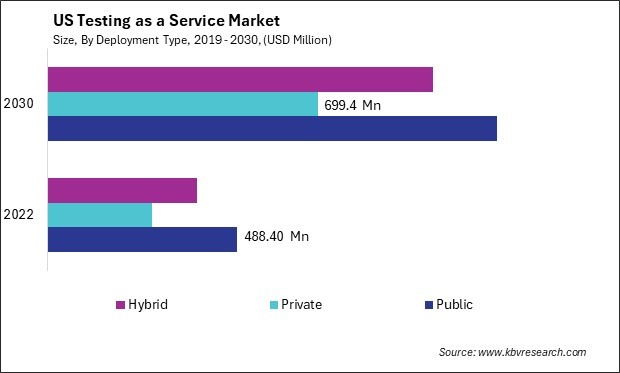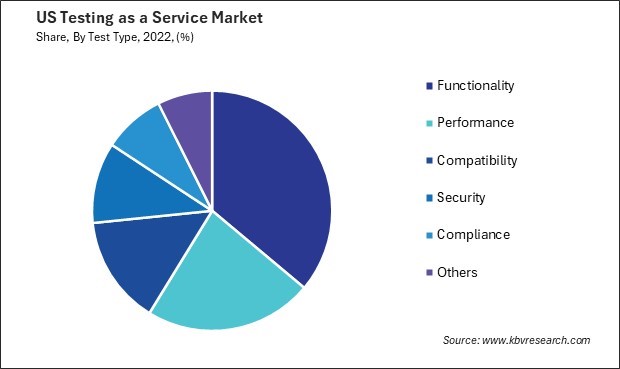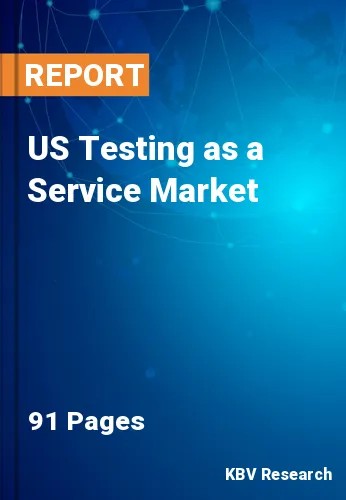The United States (US) Testing as a Service Market size is expected to reach $2.9 Billion by 2030, rising at a market growth of 12.3% CAGR during the forecast period.
The testing as a service market in the United States has witnessed significant growth and evolution, reflecting the dynamic landscape of software development and quality assurance. As technology advances, businesses across various industries in the U.S. increasingly rely on testing as a service solution to ensure the reliability and performance of their software applications.

One key driver of the testing as a service market in the U.S. is the rising demand for cost-effective and scalable testing solutions. Companies recognize the benefits of outsourcing testing services to specialized providers, allowing them to streamline their processes and focus on core business activities. The U.S. testing as a service market is characterized by various service providers offering various testing services, including functional testing, performance testing, security testing, and more.
In the United States, the COVID-19 pandemic acted as a catalyst for rapid technological advancements and digitalization. American businesses swiftly embraced remote work solutions, transforming traditional work structures. The healthcare sector witnessed an acceleration in telehealth services, expanding access to medical care. Additionally, the e-commerce industry experienced a surge in demand, prompting innovations in online shopping experiences. Moreover, the emphasis on digital transformation and adopting agile and DevOps methodologies have fueled the demand for continuous testing practices. Testing as a service providers in the U.S. are crucial in supporting organizations in their journey toward faster and more reliable software delivery.
The testing as a service market in the U.S. healthcare sector is experiencing a significant surge in demand, driven by the increasing emphasis on quality assurance and regulatory compliance. One of the key factors contributing to the growth of testing as a service market in the U.S. healthcare industry is the rising complexity of healthcare software and applications. With the implementation of electronic health records (EHRs), telemedicine solutions, and other digital health tools, the industry faces interoperability, data security, and overall system performance challenges. Testing as a service provider is crucial in addressing these challenges by offering comprehensive testing solutions encompassing functionality, security, and performance testing in the U.S.
Moreover, the stringent regulatory environment in the U.S. healthcare sector, including compliance with the Health Insurance Portability and Accountability Act (HIPAA), further propels the demand for specialized testing services. Testing as service providers must navigate and adhere to these regulations, ensuring that healthcare organizations meet the necessary standards for data privacy and security. As healthcare organizations strive to enhance patient outcomes and optimize operational efficiency through technology adoption, the reliability of software applications becomes paramount. Testing as a service enables thorough healthcare software testing, identifying and rectifying potential issues before deployment.
According to the National Health Expenditure Account (NHEA), U.S. healthcare spending grew 4.1% in 2022, reaching $4.5 trillion or $13,493 per person. As a share of the nation's Gross Domestic Product, health spending accounted for 17.3%. This financial dedication indicates the rising importance of health-related services and resources within the country. As the demand for healthcare services continues to escalate, a parallel trend emerges in the testing as a service market. With the increasing need for diagnostic and preventive measures, the healthcare industry will likely witness a surge in demand for testing services, reflecting the nation's ongoing investment in health and well-being.
The testing as a service market in the United States has witnessed a substantial increase in functionality, reflecting the growing demand for efficient and comprehensive testing solutions. As American businesses continue to embrace digital transformation and technology advancements, the need for robust testing services has become paramount to ensure the reliability and performance of software applications. One key driver behind the surge in testing as a service functionality is the escalating complexity of software systems. With the advent of artificial intelligence, machine learning, and the Internet of Things (IoT), applications have become more intricate and interconnected.
Furthermore, the heightened emphasis on cybersecurity has propelled the demand for testing as a service in the U.S. with enhanced security testing capabilities. As cyber threats evolve, organizations in the United States are increasingly investing in comprehensive testing services to identify vulnerabilities, assess data protection measures, and fortify their digital infrastructure against potential breaches.
The dynamic nature of the U.S. business landscape, characterized by rapid innovation and shorter time-to-industry cycles, has fueled the need for agile testing services. Testing as a service provider is adapting to this trend by offering flexible and scalable testing solutions that align with agile development methodologies, enabling U.S. companies to deliver high-quality software at an accelerated pace. Thus, the surge in testing as a service reflects its imperative role in ensuring software applications' robustness amid technological advancements and evolving cyber threats.

The testing as a service market in the United States has experienced significant growth in recent years, driven by the increasing demand for efficient and cost-effective software testing solutions. Sauce Labs is a notable player in the U.S. testing as a service market. Established as a cloud-based testing platform, Sauce Labs provides automated testing services that enable organizations to test their web and mobile applications across different browsers and devices. The company's comprehensive testing solutions aim to improve the quality and performance of software applications, ensuring a seamless user experience.
Another prominent player that has significantly impacted the U.S. testing as a service market is Applitools. Specializing in visual testing and monitoring, Applitools uses artificial intelligence (AI) and machine learning (ML) technologies to detect bugs and ensure applications' visual accuracy. With a focus on delivering visually perfect user interfaces, Applitools caters to the growing demand for enhanced visual testing capabilities in the software development lifecycle.
Perfecto, now part of Perforce Software, is a key player offering a cloud-based continuous testing platform. With a focus on providing end-to-end testing solutions, Perfecto enables organizations to achieve faster and more reliable software releases. The company's platform supports various testing scenarios, including functional, performance, and security testing, making it a comprehensive choice for businesses looking to streamline their testing processes.
Another notable player is SmartBear, which offers testing tools and solutions catering to different aspects of the software development lifecycle. With products like TestComplete and CrossBrowserTesting, SmartBear enables comprehensive test automation, ensuring the efficiency and reliability of software applications across various platforms and browsers.
Applause, a crowd-testing platform, has gained traction in the U.S. testing as a service market by leveraging the power of a global community of testers. The company allows businesses to crowdsource testing efforts, enabling them to test their applications under real-world conditions and diverse user scenarios. This approach helps organizations identify issues that go unnoticed in traditional testing environments. As the testing as a service market demand continues to grow, these companies and several others are playing a crucial role in shaping the landscape of software testing in the United States.
By Deployment Type
By Test Type
By Application
Our team of dedicated experts can provide you with attractive expansion opportunities for your business.

